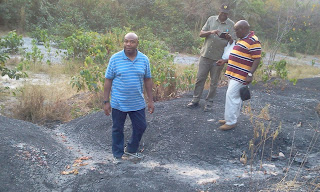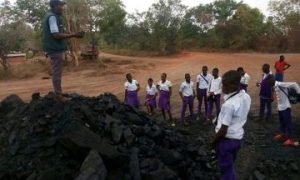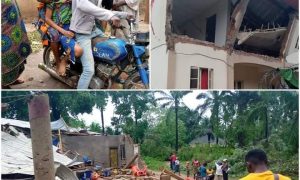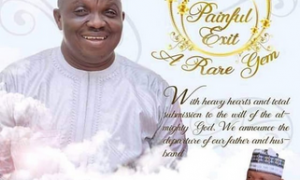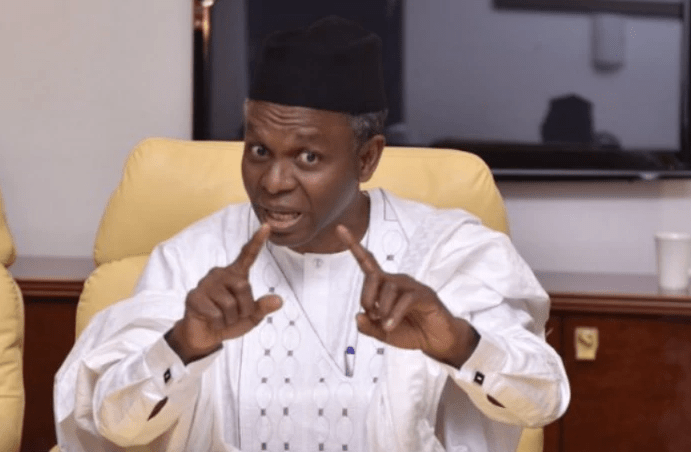idoma news
Interesting facts you need to know about Owukpa people of Benue State (SEE PICTURES)
Story and pictures by Ameh Comrade Godwin
A journey by road to Owukpa, a community in Ogadigbo Local Government Area of Benue State is indeed – hectic and stressful to say the least.
As one leaves behind the mega city of Lagos, and navigates through the entrails of the south west corridor, you will behold the cities of the Twenty First Century but by the time you get to your destination you will see visage that belong to a distant past.
ALSO READ: SCAM! Contractors abandon N120m Aho-Ukwo Owukpa road (PHOTOS)
As our cab ply through the Orokam-Owukpa expressway, we are forced to gaze at rural interface on both side of the road.
Elephant grasses grow luxuriantly. Kids play with catapults. Aged men with their hoes hanging over their shoulders chat while heading from their farms.
Women carry bundles of firewood return from farms to go and cook the evening meals. The community is trapped in a time warp. Ancient is the word.
Nestled on the edge of Ogbadibo is the picturesque city of Owukpa.
Owukpa, an antiquated city occupies a strategic position on the edge of the food basket state, a force to reckon with in the agricultural terrain with a sprinkle of academics.
Beyond reasonable doubt one would concur that this community dominated by over 100,000 head is indeed blessed. In fact, it’s an enigma in the eyes of other neighbouring towns and villages. A hinterland comprising two juxtaposed communities: Ehaje and Itabono.
At the outskirt of the town, you are welcomed by a signboard that simply says “Welcome to Owukpa”. Ironically, the signboard was erected by a defunct Owukpa Community Bank, OCB.
Owukpa is a city, bordered by ‘big ego’ cities – among others, Ebonyi and Enugu State in the south.
ALSO READ: REVEALED: Why Owukpa Coal deposit was abandoned, The Akume, C.S Tarka’s connections
| Holy Ghost Fire Catholic Church, Audu Owukpa |
| Adu Village Square |
| Assemblies of thhe Lord’s Called Ones, Adu |
| Itabono – Obollo Road |
| Itabono Road, close to Akpugo Square |
| Defunct Owukpa Community Bank |
| Aerial view of Ukwo Owukpa market |
| Ojogwu hill |
| River Adu |
| River Adu |
| Inside Ukwo market |
| Okpoga -Owukpa road |
| Okpoga – Owukpa road |
| Okpoga – Owukpa road |
| St. Edward Primary Sch, Ai Odu |
| Inside Ukwo market (okada park) |
| Ipole Owukpa |
| First petrol station in Owukpa |
| Ukwo |
| St. Edward Catholic Parish, Ukwo |
| Ukwo |
| Home of Comrade Apeh Boniface, Udaburu |
Five days in Owukpa, the community that houses the best grade of coal in Nigeria was fun and exciting, a huge experience that one wishes to have more.
The name Owukpa is derived from the word Ayi-okpa or Owo-Okpa which means descendant of the river. The name is apt because the town, founded right on Ojogwu hill, is encircled by three rivers – Awube, Adu and Okpokwu.
The people of Owukpa are Idomas. Historically, it was founded by a hunter called Amuche Onomo who migrated in 1450, from Ankpa in Kogi State. Amuche had six children and each one of them founded a community, which altogether became the six clans of the Owukpa community.
The traditional stool of leadership is rotated among the six clans in addition to the seventh, which was granted clanship status in 1977 by the Benue State government. Together the seven clans formed Owukpa town.
This medium-sized town has a population of about 100, 000 people who are mostly farmers. Emmanuel Ameh, a renowned farmer and cleric reinforces this fact. He says: “our major occupation here is farming.
We inherited this from our forefathers. Then we didn’t have the opportunity to go to school but now we try as much as possible to send our children to school in order to acquire modern education”. A minority of the populace are also hunters. These two occupations, farming and hunting, were handed down from generation to generation. But today, the younger generation has chosen a different path. A few have taken up teaching and trading.
Life in the community follows a familiar pattern. As early as 6 am, peasant farmers are up and about making their ways to their farms. Their women set about household chores that take up their time from sun up till sun down. Yet from this modest community have sprung great and illustrious men.
Ask an average indigene, and he will proudly tell you that the community has produced great and illustrious men. Even indigene as young as teenage Eneh, a student of Owukpa Community Secondary School, can enumerate a score of names, among them, Honourable Christopher Obute, former commissioner of Finance in Benue State, Chief Isaac Oduh (Ejekwote K’Idoma, Boniface Agada Apochi, Chief Paulinus Igba, Late Chief Ajunwa Onoja, Evang. Innocent Akor, Ambassador Godwin Agama, Late Ebenezer Ameh Odoh, Dr. Austine Ameh, to mention but a few.
Despite the fact that Christianity is well-rooted in the community, traditional religious still has a stout stump. The community has not totally thrown away the worship of deities which their forefathers cleaved to. One of the deities still widely worshiped goes by the name Aj’Owukpa.
An indigene, Ameh Akogwu, who is a traditionalist asserts: Aj’Owukpa is strong and active, despite the coming of Christianity. We still appease the god and it protect us”.
The shrine is located in Ipole Owukpa, where the remains of the late Amnuche Onomo, the founder of Owukpa was interred.
There is, at least, half dozen gods worshipped by the people. Among the pantheons are Onyipkechi, (sun god ) and Ekwu Anya, a popular god whose affairs are administered by women.
However, there has been a gradual erosion of the traditional worship. This is captured by Emmanuel Attah, son of one of last custodians of Onyikpechi (the sun god) “After my father died, my uncle who is a cleric came from Lagos and returned everything to the village square, because there is nobody to take over. I am a born again Christian, likewise my siblings, we don’t believe in the gods”.
According to him, six of the custodians, who served as the chief priests of the gods are all deceased. Among them were, Agada Olufu, Amedu Ura, Omonu Odachi and Attah Emure.
He voiced the conviction of the younger generation: “I see no reason I should still take over from my father after his death” the young man states.
Today, about 95 percent of the indigenes are Christians – as there are those who belonged to the old and the orthodox –Catholics and Methodist – so are adherent of the New and the Pentecostal – Deeper Life and Redeemed Churches. Like the sudden religious change that overtook the village of Umuofia in Things fall Apart, the ‘new religion’ has captured the heart of the younger generation.
Not all traditions, however, are jettisoned. A few customs are still held sacrosanct.
ALSO READ: Things to know about Orureshi (New Yam Festival) in Owukpa
The celebration of the New Yam festival, called Orureshi is a cultural fiesta that the people still hold in high esteem. The epic festival holds mainly in the month of August. During the New Yam festival, people gather at the village square with different food and holds cultural activities that include masquerades displays, from different clans and groups.
The occasion is always an opportunity for reunion among friends and family members.
Owukpa is duly blessed with natural resources such as cash crops such as palm trees and other economic trees such as Iroko and Obeche, mahogany and Gmelina grew around Owukpa in abundance. Medicinal plants also abound. Because the population is mostly farmers, Owukpa is inevitably a town of many market days.
At least there are no less than eight markets in and around the town – Ukwo, Ahor Ai Famu, Aho Ugbugbu, Ahor Okpudu, Ede Ejaa, Eke Adepe, Eke Akpa, . But the most popular is the Ukwo market day. On a typical market day, people from 42 villages, those that make up the community and beyond, converge on the market square, which also attracts traders from neighboring towns in the state and from the south eastern parts of the country.
Ironically, the market is but a conglomerate of small huts, roofed with corrugated iron sheet. Yams, banana, cassava, groundnuts and livestock, especially goats, as well as palm products – Palm oil, palm kernel, palm wine – are some of the major food commodities in the market.
Not few outsiders may have heard that Owukpa has a coal field at Ibagba. The site today is overtaken by tall grasses, and old and rusty machineries and vehicle littered the field.
As the Idoma people wait patiently for the creation of a long-awaited Apa State, Owukpa prepares with great expectation to clinch a local government status.
The sentiment runs deep in the society. One incident convinces me just how deep it runs.
As I prepare to leave the coal city after five eventful days, a knock came on the door. A middle-aged man stands at the door:
“I am Idoko, a primary school teacher” he introduces himself. “Please, when you get back to the city tell them that we are waiting for the creation of Apa State, so we can have our own Adu Local government. Also tell them that we are waiting for the establishment of coal depot as the Vice President promised”.
While I share his hopes, I equally have my fears. Sometimes, promises made by politicians are often mere weasel words.
For Advert: Call 08171607004, 09058228464 Follow us on Twitter @idomavoice, @idomanews Send us releases at idomavoice@gmail.com

